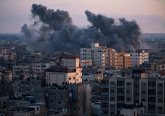The television screens did not lie. There he was. An old man in a cage. The cage was in a Cairo courtroom, and the baying crowd in the gallery were screaming for his conviction, sentence and execution.
Those watching the television broadcasts across the Arab world on 3 August could hardly believe their eyes. Here was Hosni Mubarak, once the proud, aloof and resolute leader of Egypt, now shackled like a common criminal and placed on trial for charges that might result in a death sentence. Had the world gone crazy?
The indictment of Hosni Mubarak is an iconic moment in the history of the Arab Spring, indeed in the history of the Arab world. The revolutions that have swept through North Africa and the Middle East since January have surprised us all. But for the Arab populations of the region, the sight of Mubarak on trial is by far the most surprising thing that has yet happened.
In Yemen, and Syria, and Libya those involved in revolution took inspiration from the television pictures of Mubarak’s despair. Might their leaders, too, find themselves in the dock? Hope of justice surged through the region as those television pictures graphically illustrated how the mighty are fallen.
Is this the moment when Egypt will prove that its revolution is real? Many will hope so, but the reality may not be so simple.
The charges against Mubarak are gruesome: it is alleged that he ordered tortures and authorised the brutalities of the secret police, that he sent out snipers to shoot and kill innocent and unarmed protestors during the January-February revolution, and that he conducted corruption on a grand scale, taking millions from the state coffers through a dodgy deal to supply gas. Might other Arab leaders be charged with similar crimes – perhaps in Damascus or Tripoli, or even Amman, Manama, or Sana?
Mubarak was not alone in his cage. There, in the courtroom set up in the Police College that once bore his name, the deposed president Mubarak was shielded from the cameras by his two sons. Dressed in white prison uniforms, Galam and Alaa Mubarak and appeared sullen and resentful. Gamal and Alaa are charged along with their father over a corrupt land deal, in which they received five luxurious villas at Sharm El-Sheikh said to be worth $7 million.
Alongside the Mubaraks stood Habib al-Adly, the former security chief and interior minister, who the public hold responsible for the killings of civilians during the revolt of January and February and who has already been convicted and sentenced to 12 years imprisonment on other charges. Six other senior policemen and security officials also stood in the cage. But there was no one from the Army, or any other sector of Mubarak’s notoriously corrupt and repressive regime.
Second Revolution
We have entered a second phase in Egypt’s revolution. It is going to prove just as critical as was the first moment of revolt in Tahrir Square. Egypt’s government is now in the hands of the generals and brigadiers – the army commanders who surrounded Mubarak and supported him so fervently over many years past. These men have seen that the future needs to be different. They have committed to lead the transition to a more democratic Egypt.
But what kind of new Egypt will this be? And what role will the army preserve for themselves in this ‘New Arab Order’? The 19 army commanders now in the ruling council have not repented of their past deeds, and many of them are closely associated with the corruption and repression of the Mubarak years. Nor have they signed a covenant with the revolutionaries of Tahrir Square. Far from it.
The aim of the military command is not to confirm and sustain the revolution, but to stem its flow. For these army men a revolt is something to be put down and quelled, not something to support and nourish. The army wants to restore peace and stability in Egypt. They do not like protest, and they have tried in recent weeks to halt the activities of the dissident groups in Tahrir Square. New laws decreed recently have made it an offence to gather for such protests, and some of those coming to Tahrir Square have been arrested and put on trial for disturbing the peace.
So, these same generals who have decided that Mubarak must be tried for his crimes are also prosecuting the perpetrators of the revolt against Mubarak: they are sending to goal those ordinary Egyptian citizens who have taken peacefully to the streets to register their protest against malign dictatorship. Egypt’s revolution is more complicated than it seems.
If this revolution is to succeed, then it needs a second wave. Mubarak’s trial might provide the impetus for this second revolution, rallying civil society and public opinion to the cause of justice and a truthful analysis of the actions of the Mubarak regime. But this may not be what Egypt’s military council wants.
The Slow Coup
Egypt’s revolution is far from over. It’s outcome still hangs in the balance. This trial, how it is conducted and what its outcome might be, could in the end prove to be decisive in determining whether or not the revolution is to be completed, or stalled.
What the world witnessed in February this year when Mubarak stepped down from power was not a successful revolution, but the first determined step in what might be best described as a ‘slow coup’. This slow coup has until now been orchestrated by army leaders determined not to allow chaos and disorder to prevail, men who believe they can marshal the political arena, contain dissent and restore a conservative order. Egypt has rid itself of one dictator, but it has not rid itself of the mind-set of military autocracy.
This slow coup needs to be understood. Egypt’s government was for decades held together by support from the West, support that was directed at maintaining Egypt’s military power as a counter-force in Middle Eastern politics. Autocracy was the accepted price to pay for Egypt’s political conservatism.
Egypt’s people squirmed with embarrassment at the policies adopted toward Israel and the Palestinian question. But their views did not matter. The political deal was done, and Egypt’s bargain with the West was secure. The military were the principal beneficiaries, and despite Egypt’s tumultuous social and economic problems, the military kept their part of the bargain by ensuring that the country remained stable.
The cost of that was to make Egypt a police state, with repression and surveillance especially acute in the urban areas. Police and the informers they regularly employed became despised, while petty corruption spiralled out of al control.
When the moment of crisis finally came earlier this year, with massive civilian protests first in provincial towns and then, spectacularly, in Cairo’s Tahrir Square, splits emerged among the political elite over how to react and the army command waivered. Delay bred doubt, and the army command began to worry that if law and order dissolved then their own position was unsustainable.
In these circumstances, the decision to sacrifice Mubarak was a reluctant compromise, not a bold leap towards a better future. The army command dallied, too, in its unwillingness to embrace civil society groups and the country’s emergent political parties. They are not comfortable talking with the ‘small people’ who led and inspired this revolt through social media and skilful use of the internet and mobile technologies. These are not the army’s methods, and these are not people that the military command respect. Every step along this road the army command has had to be nudged and cajoled, reluctant revolutionaries to be sure.
And so the slow coup took shape. The military have gradually, reluctantly and haltingly taken charge. They now control the political arena, but seem to lack a clear plan of how transition should be implemented. Decisions are made and remade as events develop. Like all revolutions, there is no plan, only uncertainty.
Will justice be seen to be done?
Some have speculated the Egypt’s army command hoped to garner sympathy for the ailing Mubarak by showing him in court. There are some who have expressed this sentiment, but the vast majority of Egyptians seem to care less about the former dictator’s health and more about the need for justice to be seen to be done. They will not be satisfied unless Mubarak is convicted.
Will this happen? The recent trial of Tunisia’s ousted leader, Ben Ali, does not bode well. Given asylum in Saudi Arabia, Ben Ali refuted the charges against him but refused to return to Tunis for the trial. In an unedifying and blatantly political spectacle he was tried in absentia, the court only taking a matter of hours to find him guilty of all charges and without troubling itself to consider too much that might be considered evidence. In Tunis, justice was not seen to be done. In many ways, Ben Ali’s own trial was as flagrantly random and draconian as anything his ousted regime had managed. Egypt needs to do better.
The trial and execution of Iraq’s Saddam Hussein was another image that came to mind as we watched Mubarak’s unease in that Cairo courtroom. Saddam’s unceremonious death was the execution of an enemy by his rivals, assisted and supported by a foreign occupier. It was an act of vengeance, gleefully carried out, and ending in a poorly conducted lynching. History will not look back on this as a glorious day, but as an undignified stain, and an indication of the difficulties the USA and its allies would encounter in trying to establish a democratic and representative government in Iraq. If Egypt’s revolutionaries wish to restore the rule of law to their country, then they must demonstrate the dignity of their courts and the power of their justice. No vengeance. No glee.
And what of the trial that so many people hope may come to pass before too long – that of Libya’s strife-torn leader Muammar Gaddafi? No one could look at Mubarak without thinking about the fate that might lie ahead for Gaddafi. The French and the British have already promised to put him on trial, though they do not yet seem able to bring it about. But Libya’s rebels took more inspiration than any other group from the sight of the cowed and ailing Mubarak in that Egyptian cage. Is this how Gaddafi will end too?
The Libyan rebels and their allies may hope so, but they will also know that such an outcome is highly unlikely. Mubarak was persuaded to step down on promises of fair treatment – gently pushed to leave power by military men who he considered to be friends as well as colleagues. He never expected to be placed in the predicament he now finds himself in. Would he have voluntarily left Cairo for Sharm El-Sheikh if he had known this trial lay ahead? No. Never.
The threat of ‘justice’ is enough to make any dictator dig in and fight on to the bitter end. And that is precisely what Gaddafi will do. He will not now allow himself to fall into the same trap that has ensnared Hosni Mubarak.
Is local justice better than international justice? Egyptians certainly think so. This is another very pertinent question. The flamboyant head of the International Criminal Court, Chief Prosecutor Ocampo, has already announced his intention to see Gaddafi stand trial and an indictment has been issued. The French and British have reiterated these threats, Britain’s Foreign Secretary, William Hague, saying that all Libyans accused of war crimes should be tried by the ICC. But would a remote and distant prosecution in the international courts satisfy public opinion in Libya? Probably not.
The question remains as to whether the Egyptian courts will prove robust enough to cope with the pressures that must surely surround such a politically potent trial. Judge Ahmed Refaat has a good reputation, and his firm handling of the court at this first hearing suggested that he is not afraid of the challenge.
The prosecution, for its part, appeared serious in purpose and design. They have already assembled thousands of pages of evidence – more than 5000 against Hosni Mubarak alone – and there is more, much more, to come. They will not have it all there own way, however. The team of lawyers gathered around Mubarak and his co-accused greatly outnumbered those on the prosecution side. Many legal battles lie ahead.
And there is bound to be high degree of political manoeuvring. Mubarak’s lawyers have already declared their intention to summon the current head of the transitional military government to give evidence. Field Marshall Mohamed Tantawi was in charge of military operations on some of the days when the shootings of civilians took place, so it does seem reasonable to suppose that he might give evidence. Others in the military council might also be summoned if Mubarak has his way, not least Omar Suleiman, the former intelligence chief. These men have betrayed him and subjected him to this humiliation. It would be surprising if he did not want to drag them all down with him.
Will this court case then result in the spectacle of Egypt’s military elite, who have run the country with an iron fist for many years, fighting among themselves for their very survival? Tantawi and his colleagues will do all they can to avoid such an outcome, but for them the trial is surely a huge gamble.
Why have they taken such a risk? It seems clear that the military elite were reluctant to allow the trial to happen. For the past few weeks there has been much speculation about whether Mubarak would in fact be indicted before the court or not. Most Egyptians thought that a deal had been done to keep him out of court, and so were all the more surprised to see the frail figure led into the courtroom cage lying in his hospital cot.
The interim military rulers were under severe public pressure to stage the trial, and under a significant degree of international pressure too. They need their friends abroad, and this was surely an important factor in the decision. But even the military command will be aware that Egypt needs to restore its national dignity, and perhaps a fair trial, conducted in public with transparency and order can go a long way toward that goal.
And if the court was to find Mubarak guilty, but was then to show clemency in passing sentence, might that be a compromise that would satisfy all sides? Might this be the next step in the slow coup that will see the military retain its power and influence in Egyptian public life, thwarting the forces of true revolution? The world awaits the verdict.
David M. Anderson is Professor of African Politics in the University of Oxford and a Fellow of St Cross College, Oxford.
The article was originally published in Mandarin, ‘Egypt’s slow coup: Mubarak caged, a nation on trial’, for Caijing Magazine (China), 13 August 2011, pp. 36-38.







No Comment